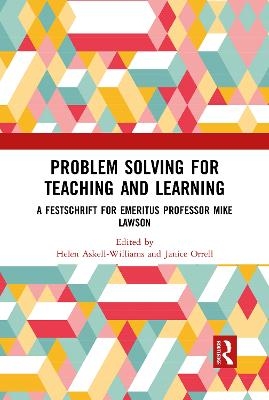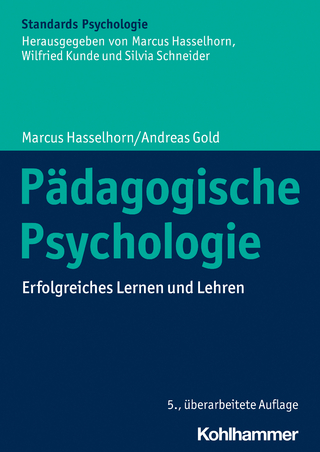
Problem Solving for Teaching and Learning
Routledge (Verlag)
978-1-032-09199-0 (ISBN)
Problem Solving for Teaching and Learning explores the importance of problem solving to learning in everyday personal and social contexts.
This book is divided into four sections: Setting the scene; Conceptualising problem solving; Teachers’ knowledge and beliefs about problem solving; and Fostering students’ problem-solving capabilities, allowing readers to gain an insight into the various sub-topics that problem solving in learning and teaching introduce. Drawing together diverse perspectives on problem solving located in a variety of educational settings, this book explores problem solving theory, including its cognitive architecture, as well as attending to its translation into teaching and learning in a range of settings, such as education and social environments. This book also suggests how effective problem-solving activities can be incorporated more explicitly in learning and teaching and examines the benefits of this approach.
The ideas developed in Problem Solving for Teaching and Learning will act as a catalyst for transforming practices in teaching, learning, and social engagement in formal and informal educational settings, making this book an essential read for education academics and students specialising in cognitive psychology, educational psychology, and problem solving.
Helen Askell-Williams (PhD) is an Associate Professor of Education at Flinders University. Helen teaches cognitive psychology and educational practice and building positive mental health in school communities. Her research focusses on teachers' and learners' knowledge about learning, and on promoting student wellbeing and positive mental health. Her most recent research is leading an Australian Research Council Discovery Grant project, Sustainability of Effective Educational Initiatives, investigating features that support the long-term success of educational programs. Janice Orrell is an Emeritus Professor of Higher Education and Assessment in the College of Education, Psychology and Social Work at Flinders University. Her work largely focusses on assessment and work integrated learning in higher education. Her recent research focusses on initial teacher education and pre-service teachers’ thinking about the work and role of teachers. She works with a non-formal school for tribal and Dalit women in southern India focussing on non-formal education for liberation and empowerment.
Section 1: Setting the Scene, 1: Michael Lawson: Teacher of Teachers and Researchers, and Academic Citizen, 2: Learning is a Problem-solving Activity, Section 2: Conceptualising Problem Solving, 3: Human Problem Solving and Instructional Design, 4: Academic Challenges as Opportunities to Learn to Self-regulate Learning, 5: Word Knowledge Quality and Literacy, 6: Developing Problem Solving and Other General Capabilities: What Will It Take and How Can We Be Sure of Success?, 7: Messy Problems of Personal and Family Life: Solving Inheritance Problems, Section 3: Teachers’ Knowledge and Beliefs about Problem Solving, 8: Teachers’ Beliefs and Knowledge, 9: The Quality of Knowledge and Beliefs that Teachers Use When Solving Teaching and Learning Problems, 10: Problematising Assessment of Student Learning, 11: Types of Knowledge Teachers Use When Solving Educational Problems: A Case Study of the Implementation of the Promoting Alternative Thinking Strategies (PATHS) Program , Section 4: Fostering Students’ Problem-solving Capabilities, 12: Problem Solving by Students with Intellectual Disability, Chapter 13: What Gifted Students and a Regular Class of Primary School Students Know and Do about Problem Solving, Chapter 14: Problem Solving Using the Keyword Method and Mental Imagery During Vocabulary Recall, Chapter 15: The Advantages and Disadvantages of Problem-solving Practice When Learning Basic Addition Facts, Chapter 16: Problem Solving in Mathematics: Evidence of High-gain Strategies, Chapter 17: Synergy between Teachers’ Knowledge and Students’ Learning: Perspectives from Research on Mathematics Education, Chapter 18: Reflections on a Ten-year Research Partnership with Glenunga International High School
| Erscheinungsdatum | 01.07.2021 |
|---|---|
| Verlagsort | London |
| Sprache | englisch |
| Maße | 156 x 234 mm |
| Gewicht | 435 g |
| Themenwelt | Geisteswissenschaften ► Psychologie ► Pädagogische Psychologie |
| Sozialwissenschaften ► Pädagogik ► Allgemeines / Lexika | |
| Sozialwissenschaften ► Pädagogik ► Bildungstheorie | |
| ISBN-10 | 1-032-09199-1 / 1032091991 |
| ISBN-13 | 978-1-032-09199-0 / 9781032091990 |
| Zustand | Neuware |
| Haben Sie eine Frage zum Produkt? |
aus dem Bereich


